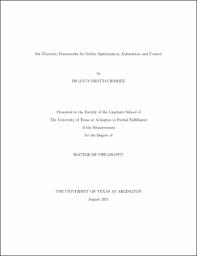
ATTENTION: The works hosted here are being migrated to a new repository that will consolidate resources, improve discoverability, and better show UTA's research impact on the global community. We will update authors as the migration progresses. Please see MavMatrix for more information.
Show simple item record
| dc.contributor.advisor | Subbarao, Kamesh | |
| dc.creator | Bhattacharjee, Diganta | |
| dc.date.accessioned | 2021-09-14T16:45:30Z | |
| dc.date.available | 2021-09-14T16:45:30Z | |
| dc.date.created | 2021-08 | |
| dc.date.issued | 2021-08-10 | |
| dc.date.submitted | August 2021 | |
| dc.identifier.uri | http://hdl.handle.net/10106/30045 | |
| dc.description.abstract | This research is primarily focused on developing online frameworks, which are suited to real-time implementation, for performance optimization, estimation, and control of dynamical systems using set-theoretic concepts and/or having set-theoretic interpretations. First, two perturbation-based extremum seeking control schemes, based on the classical setup and equipped with novel adaptation laws for the perturbation signal amplitudes, are proposed for general single input single output nonlinear systems. The proposed schemes are able to extremize steady-state system output in a practical asymptotic sense, i.e., the system is driven to an arbitrarily small set centered at the true steady-state optimal operating point. The next development involves a semi-analytical model for avian-scale (or bird-scale) forward flapping flight. Results generated through this model indicate optimal characteristics of force generation in the unique range of Strouhal numbers used by birds for cruising. Then, constructive arguments are provided leading up to a hypothesis which postulates that birds use some form of online optimization for converging to this unique range during a flight. The hypothesis is investigated using one of the proposed extremum seeking control schemes as the optimization framework.
Furthermore, a novel set-membership state estimation algorithm using state dependent coefficient parameterization for discrete-time nonlinear systems is developed, and it requires solutions to two semi-definite programs. A linear variant of this estimator is considered in the context of leader-follower multi-agent synchronization. A distributed protocol design is proposed to make the agents closely follow a leader's trajectory. Finally, model predictive control is applied to synthesize lateral acceleration commands of missiles for planar engagements. The guidance problem is converted into a recursive algorithm that does not require target acceleration information and involves solving for strictly convex quadratic programs. Detailed simulation results are used to both illustrate all the theoretical results and verify the hypothesis. | |
| dc.format.mimetype | application/pdf | |
| dc.language.iso | en_US | |
| dc.subject | Set-theoretic methods | |
| dc.subject | Nonlinear systems | |
| dc.subject | Nonlinear control and estimation | |
| dc.subject | Extremum seeking control | |
| dc.subject | Optimization | |
| dc.subject | Flapping flight | |
| dc.subject | Model predictive control | |
| dc.subject | Set-membership filtering | |
| dc.subject | Missile guidance | |
| dc.subject | Multi-agent systems | |
| dc.subject | Synchronization | |
| dc.subject | Graph theory | |
| dc.title | SET-THEORETIC FRAMEWORKS FOR ONLINE OPTIMIZATION, ESTIMATION, AND CONTROL | |
| dc.type | Thesis | |
| dc.degree.department | Mechanical and Aerospace Engineering | |
| dc.degree.name | Doctor of Philosophy in Aerospace Engineering | |
| dc.date.updated | 2021-09-14T16:45:31Z | |
| thesis.degree.department | Mechanical and Aerospace Engineering | |
| thesis.degree.grantor | The University of Texas at Arlington | |
| thesis.degree.level | Doctoral | |
| thesis.degree.name | Doctor of Philosophy in Aerospace Engineering | |
| dc.type.material | text | |
| dc.creator.orcid | 0000-0002-3024-5936 | |
Files in this item
- Name:
- BHATTACHARJEE-DISSERTATION-2021.pdf
- Size:
- 8.526Mb
- Format:
- PDF
This item appears in the following Collection(s)
Show simple item record


